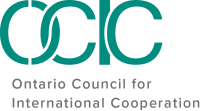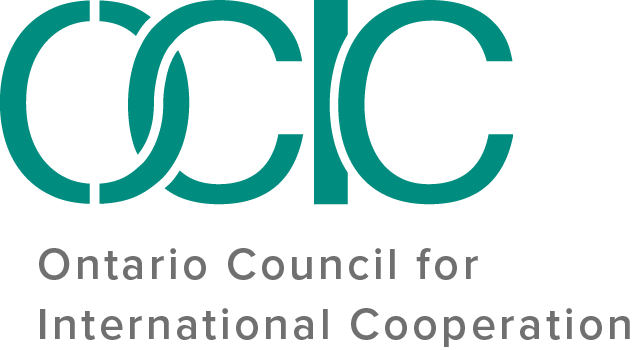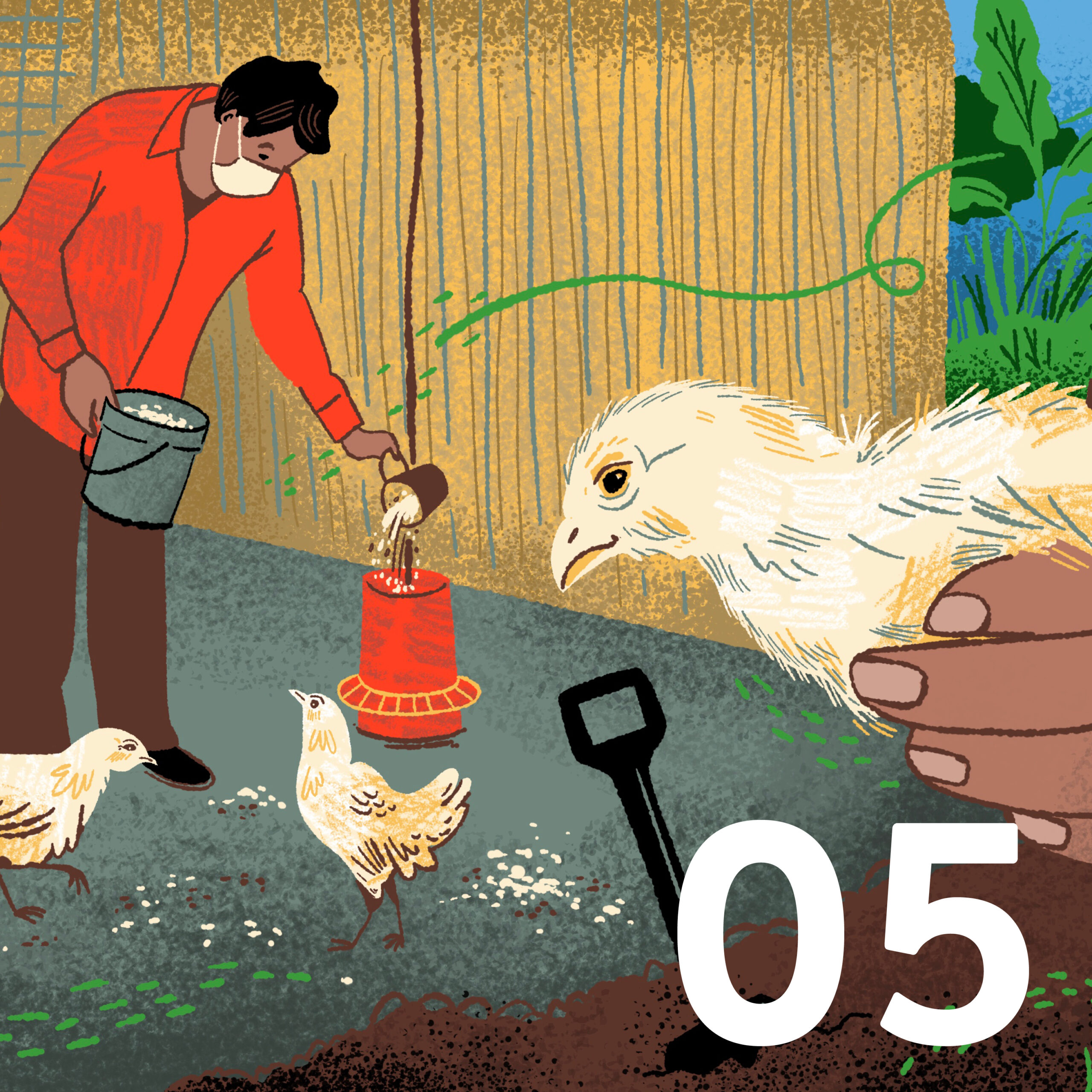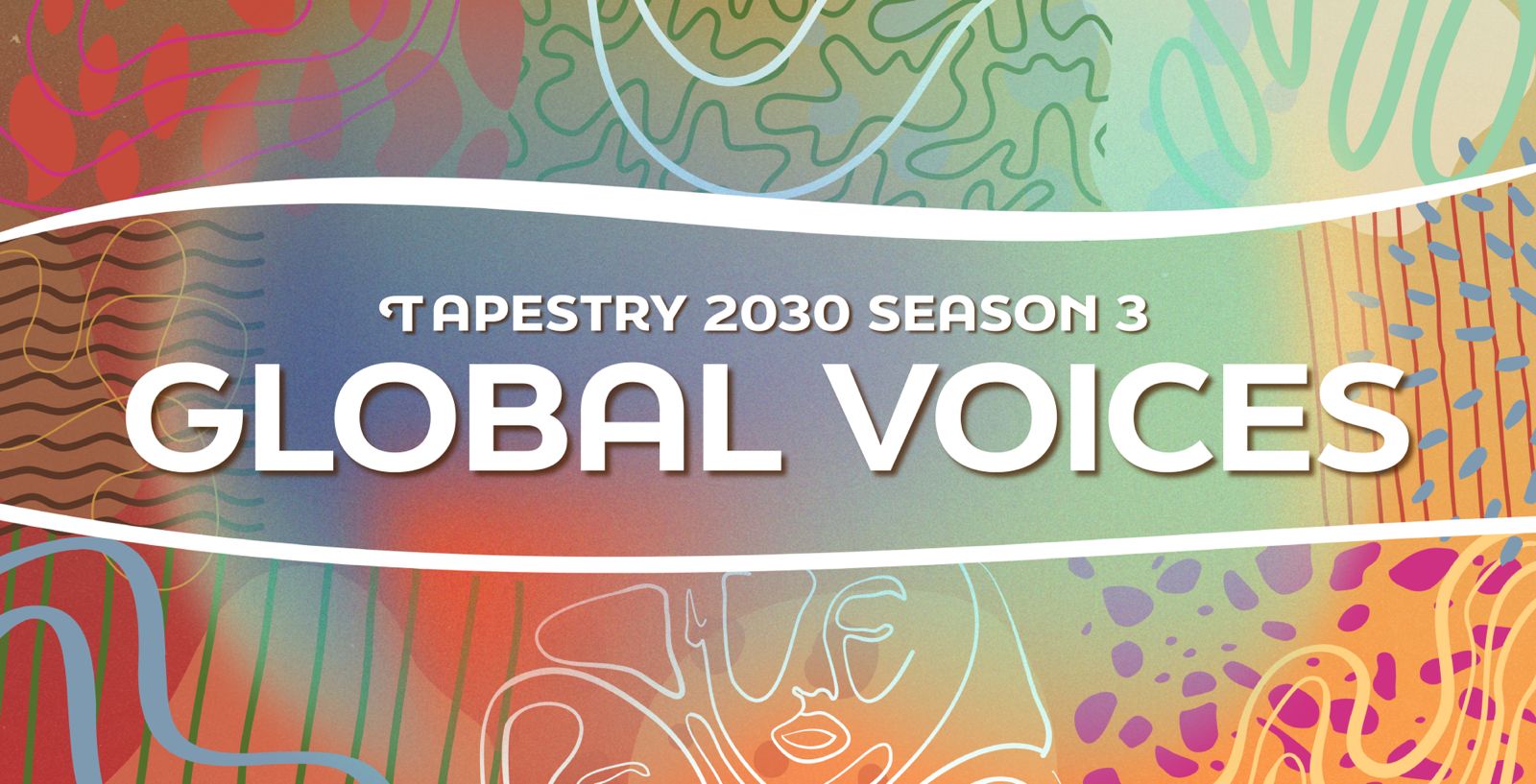
TAPESTRY 2030 PODCAST
season 3
OCIC and the Youth Policy-Makers Hub are excited to officially launch Tapestry 2030 Season 3: Global Voices. This new season was created and hosted by a team from the 2023-2024 Youth Policy-Makers Hub. These discussions seek to identify and amplify voices of marginalized communities who have largely been excluded from international cooperation, development, and policy conversations. The goal is to identify challenges that these groups face within local, national, and international contexts, and create strategies so that they can be better included and prioritized.
Thank you for listening and thank you to the YPH team for this amazing new season: Hudson Biko Mwalagho, Kenda-Lee Heney, Bernice Mwaura, Charles Oulton, and Shoffana Sundaramoorthy.
Episode 6: Migrant Worker Rights in Canada
In this episode about Migrant Worker Rights in Canada, host Bernice Mwaura is joined by two notable guests; Professor Ethel Tungohan of York University and Gabriel Allahdua of Justicia for Migrant Workers, to explore Canada’s Temporary Foreign Worker program in all its facets, while exposing the systemic abuse and issues that require reform.
Episode 5: The Intersection of Indigenous and Environmental Perspectives (Part 2)
In part two of this discussion around The Intersection of Indigenous and Environmental Perspectives, host Shoffana Sundaramoorthy is joined by Alicia Richins of The Climateverse to share her insights around Indigenous and environmental perspectives, including how amplifying localized and marginalized voices through digital media are critical steps towards transformational change.
Episode 4: Building Inclusive Communities in Canada
In this episode, Building Inclusive Communities in Canada, host Charles Oulton explores the topic of building inclusive communities within Canada, with a focus on his home community of Kingston, Ontario. This episode features two guests, Yu Jier Kou of Kingston Immigration Partnership and Roger Romero of Kingston Community Health Centres, who are making significant strides in fostering inclusivity and support for diverse populations in the Kingston community.
Episode 3: Disability Inclusive Development
In this episode, host Kendra Heney is joined by four incredible guests Catherine Cameron, James Chidzanja, Puwata Deogratias, and Livingstone Koech, to highlight some of the adversities people with disabilities in East Africa face including traditional attitudes, stigma, lack of access, and lack of enforcement of global and national policy. The take-away message is that we cannot leave anyone behind in international development; people with disabilities must be included in all conversations and program areas.
Episode 2: The Intersection of Indigenous and Environmental Perspectives (Part 1)
In part one of this discussion around The Intersection of Indigenous and Environmental Perspectives, host Shoffana Sundaramoorthy is joined by Hayley Roulstone of Rise Consulting to share her insights around Indigenous and environmental perspectives. She also reflects on the role of governments, not-for-profit organizations, and businesses, in reference to how they aid and advance reconciliation efforts in different ways.
Episode 1: Working in Community to Address Period Poverty
In our first episode of the YPH’s Tapestry 2030: Global Voices podcast, Hudson Biko Mwalagho is joined by two young leaders in Kenya, Fayne Soida and Mumbi Mwangi, of the Soida Foundation. The episode will provide an overview of the issue, its connection to other issues such as food security and child marriage, the impact of stigma around menstruation, highlight locally led solutions, and share recommendations to promote menstrual equity.
season 2
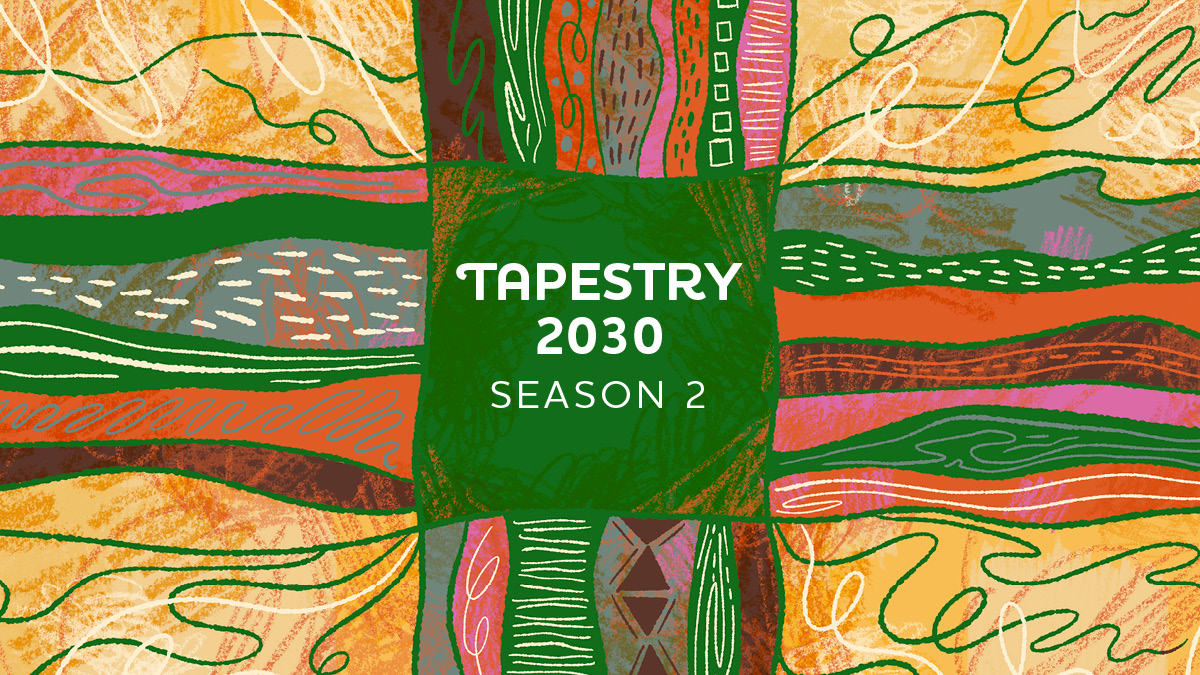
OCIC is excited to officially launch Tapestry 2030 Season 2 in partnership with Cultural Seeds, Heart-Links | Lazos de Corazón, the Primate’s World Relief and Development Fund, Rayjon Share Care of Sarnia, Inc. and their respective international and community partners.
Building on the success of Season 1 of ‘Tapestry 2030’ launched in February 2021 with support from podcaster Safa S. and illustrator Amanda Schutz , ‘Tapestry 2030’ Season 2, will further our exploration on the future of international cooperation and global solidarity and the partnerships needed for gender transformative, sustainable development with a focus on the concept of ‘localization’. Find more resources on ‘localization’ and information on season 2 on our Global Citizens Forum 2022 page here.
Episode 1: Local Thinking, Design and Leadership
In our first episode of OCIC’s ‘Tapestry 2030’ Season 2 podcast and illustration series, OCIC Communications Specialist, Eliana Fleifel, invites Brian Tomlinson, Executive Director of AidWatch Canada, and Marlen Mondaca, localization and development expert, to share what ‘localization’ means to them personally; why it is important; challenges and opportunities they have noted within this agenda; and their take on why the international cooperation sector needs to prioritize ‘localization’ to ensure a just, gender equal, and sustainable future. Find the episode transcript here.
Episode 2: Dominicans Driving the Vehicle of Change
Episode 3: Land. Food. Culture. Justice.
Episode 4: Securing a Future
Episode 5: Sustainability Comes from the Community: the Example of San Isidro, Peru
season 1

Tapestry 2030: Season 1
Tapestry 2030 launched on February 8, 2021 in celebration of International Development Week 2021. You can listen to our podcast directly through our website or on your preferred podcast player, including Spotify, Apple Podcasts, Google Podcasts, Stitcher, Podcast Addict, Podchaser, Deezer, Listen Notes, Overcast, Pocket Casts, Castro, and Castbox.
About Tapestry 2030
Tapestry 2030 is a new OCIC podcast and illustration series focused on the future of international cooperation and global solidarity, and the partnerships needed for gender transformative, sustainable development.
Undertaken with support from podcaster Safa Shahkhalili and illustrator Amanda Schutz, this inaugural series will share stories from OCIC members Bhutan Canada Foundation, CAP Network, CMETrust, Heart-Links | Lazos de Corazón, Inter Pares, Partners in Health Canada, Rayjon Share Care of Sarnia Inc., the YMCA of Greater Toronto, and their respective international partners. The Tapestry 2030 series is focused on the future of international cooperation and global solidarity, and the partnerships needed for gender transformative, sustainable development.
Episode 1: Building Sustainable Tourism in Bhutan
In our first episode we are in conversation with Dorji Dhradhul, the Director-General of the Tourism Council of Bhutan and Kent Schroeder, Stephen Couchman, and Catherine Smart from the Bhutan Canada Foundation. They reflect on their partnership and their shared work to restore the Trans Bhutan Trail (TBT). Find the episode transcript here.
Episode 2: Leadership in Action in Peru
In our second episode we are in conversation with Erla Hoyos Zuloeta from the Centro de Formación y Promoción Humana “Santa Ángela” in Peru and Ruth Taylor from Heart-Links Lazos de Corazón in Ontario. They reflect on their partnership and their commitment to develop and train community leaders in the district of Jose Leonardo Ortiz, Chiclayo, Peru. The episode transcript can be found here.
Episode 3: Championing Education in Kenya
In our third episode we are in conversation with Victoria Sheppard, Titus Kuria, Esther Njenga, Jecinta Akoth, Jesse Jacktone and Emmanuel Angwenyi from the Canada Mathare Education Trust. They reflect on their cross-cultural team’s commitment to providing educational scholarships and various educational programs and support for young people living in Mathare, the second largest informal settlement in Nairobi, Kenya. Find the episode transcript here.
Episode 4: Cultivating Relationships with the Land in Colombia
In our fourth episode we are in conversation with Nelson Buitrago Díaz and Diana Carolina Gallego Cortes from YMCA Risaralda in Colombia and Esperanza Monsalve from YMCA of Greater Toronto. They reflect on their partnership and their work on a multigenerational initiative to plant urban gardens and promote recycling in Risaralda, Colombia. Find the episode transcript here.
Episode 5: Nourishing Community in Guinea Bissau
In our fifth episode, we are in conversation with Rugui Balde from Tiniguena in Guinea Bissau and Eric Chaurette from Inter Pares in Ottawa. They reflect on their 30 year long partnership and their work to promote food sovereignty and women’s economic empowerment in Guinea Bissau. Find the episode transcript here.
Episode 6: Community Based Orphan Care in Kenya
In our sixth episode we are in conversation with Leonora Obara from Kijiji Cha Upendo in Kenya, Linda Levin from Village of Love Canada, and Claire Holloway Wadhwani from the Canada Africa Partnership (CAP) Network. They reflect on their decade long partnership and commitment to supporting community based orphan and vulnerable child care in Kibera, the largest slum in Africa. See the episode transcript here.
Episode 7: Haitian Women in the Lead
In our seventh episode we are in conversation with Elida Jeanty and Bénicie Pierre from the Haitian Women’s Federation of Haut de St. Marc, Renaud Thomas from Rayjon Share Care Haiti, and Heather Smith from Rayjon Share Care Canada. They reflect on their partnership and their shared work to establish a Breadfruit Processing Factory and Breadfruit Tree Nursery in the Haut de St. Marc community in Haiti. See the episode transcript here.
Episode 8: No Woman or Girl Left Behind in Malawi & Sierra Leone
In the last episode of our first series, we are in conversation with Isata Dumbuya from Partners In Health Sierra Leone, Basimenye Nhlema from Partners In Health Malawi, and Ian Pinnell from Partners In Health Canada. They reflect on the partnership model of their umbrella organization and their collaboration on a 5 year long Global Affairs Canada funded initiative entitled “No Woman or Girl Left Behind.” Listen to the episode transcript here.
Guiding Principles
The Tapestry 2030 Storytelling Initiative is guided by:
1. The Istanbul Principles for CSO Development Effectiveness, which include:
- Respect and promote human rights and social justice
- Embody gender equality and equity while promoting women and girls’ rights
- Focus on people’s empowerment, democratic ownership and participation
- Promote environmental sustainability
- Practice transparency and accountability
- Pursue equitable partnerships and solidarity
- Create and share knowledge and commit to mutual learning
- Commit to realizing positive sustainable change
2. OCIC’s gender transformative approach, which emphasizes intersectionality and presents an opportunity to further our collective work towards and policies on women’s rights and gender equality, anti-oppression and public engagement
3. The Government of Canada’s Feminist International Assistance Policy (FIAP), feminist and integrated approach to development, which sees gender equality and the empowerment of women and girls in a manner that is both targeted and cross-cutting
